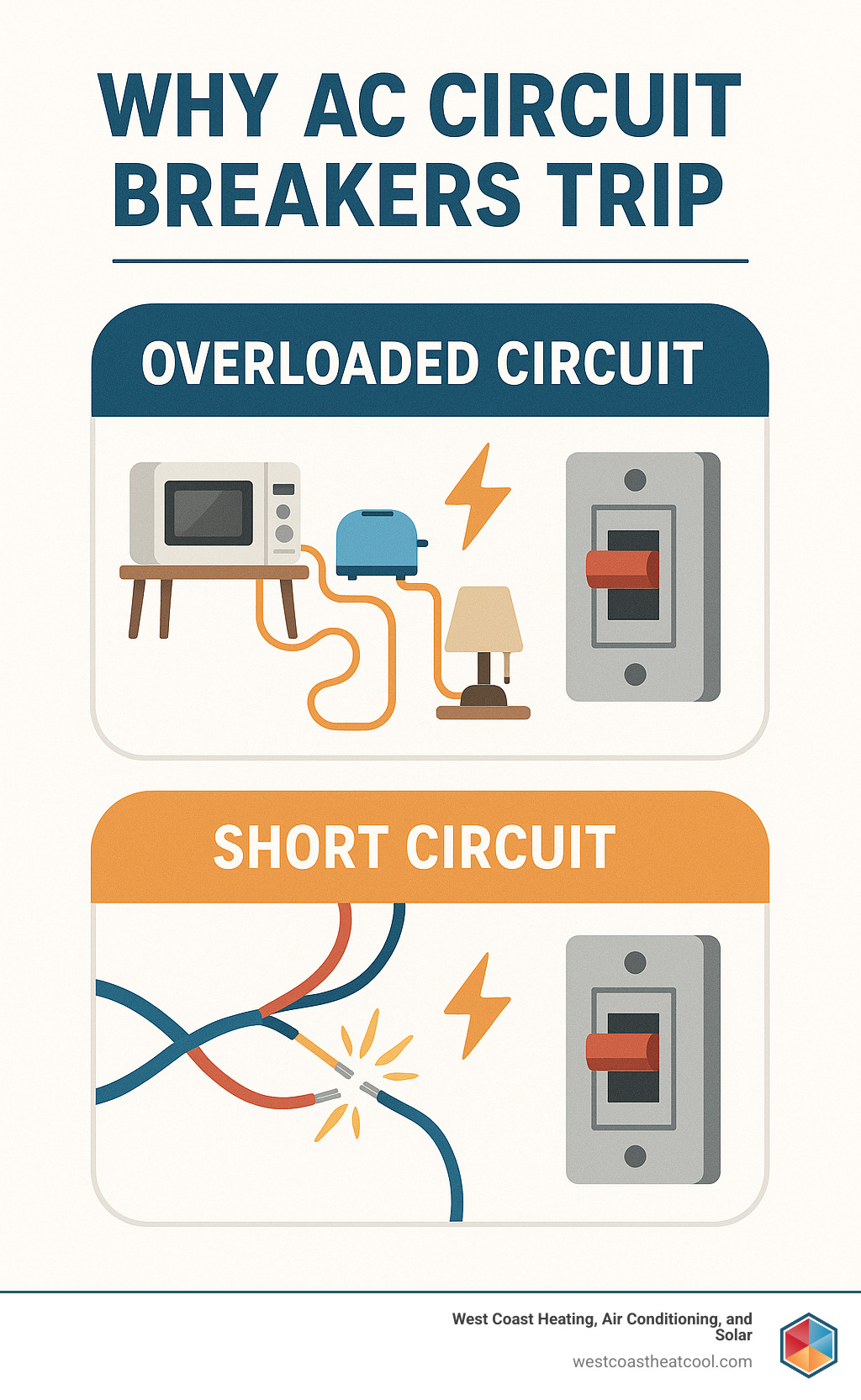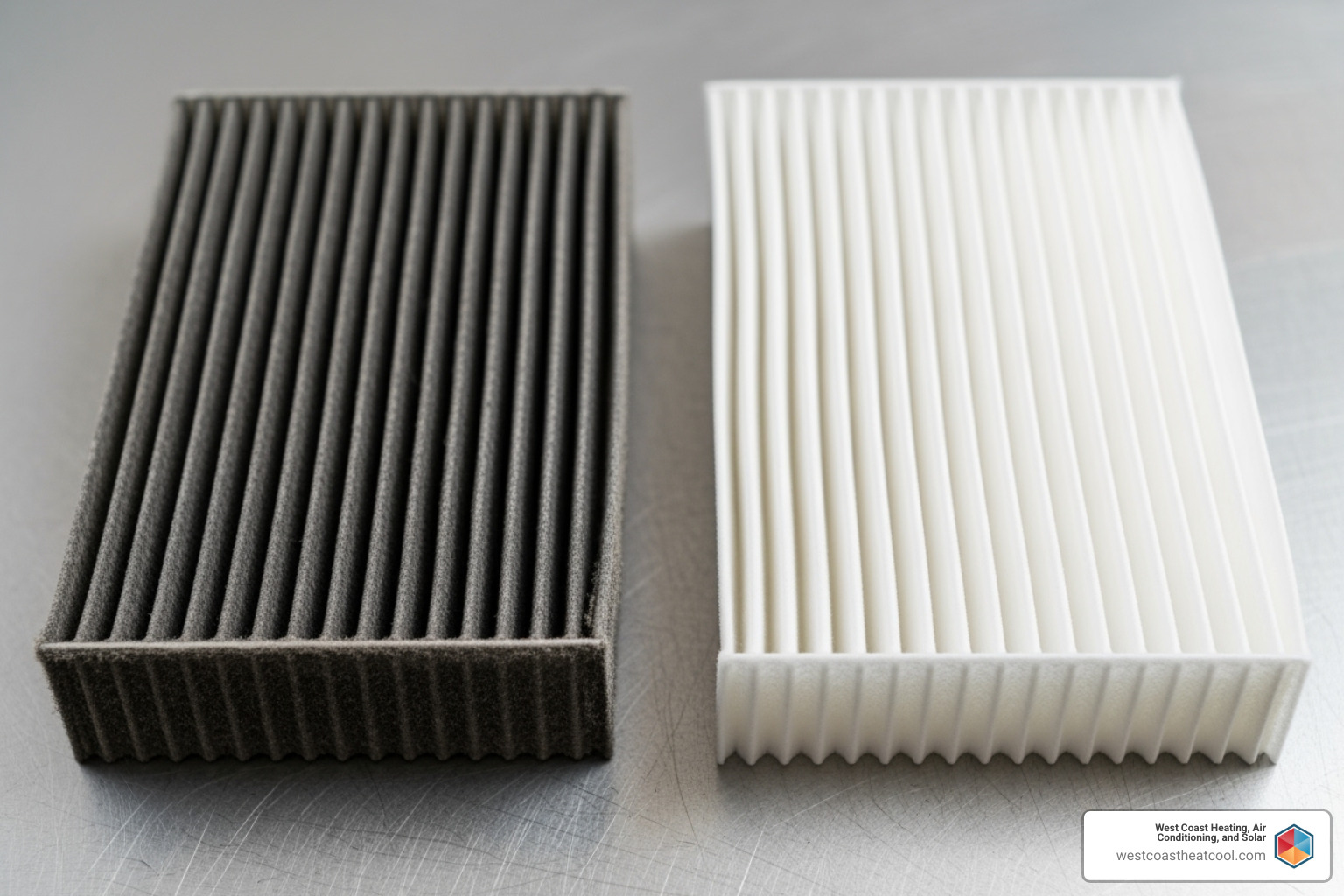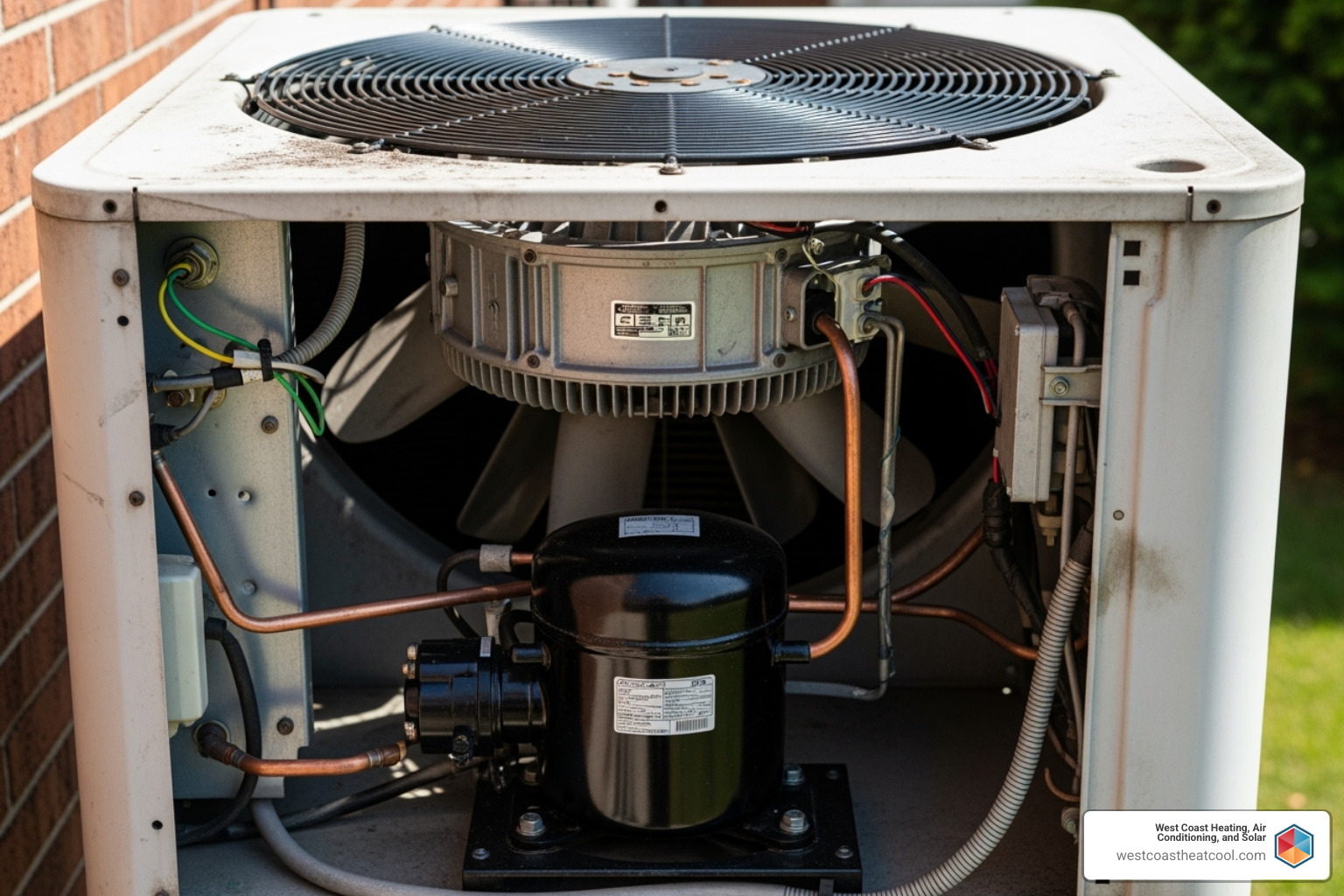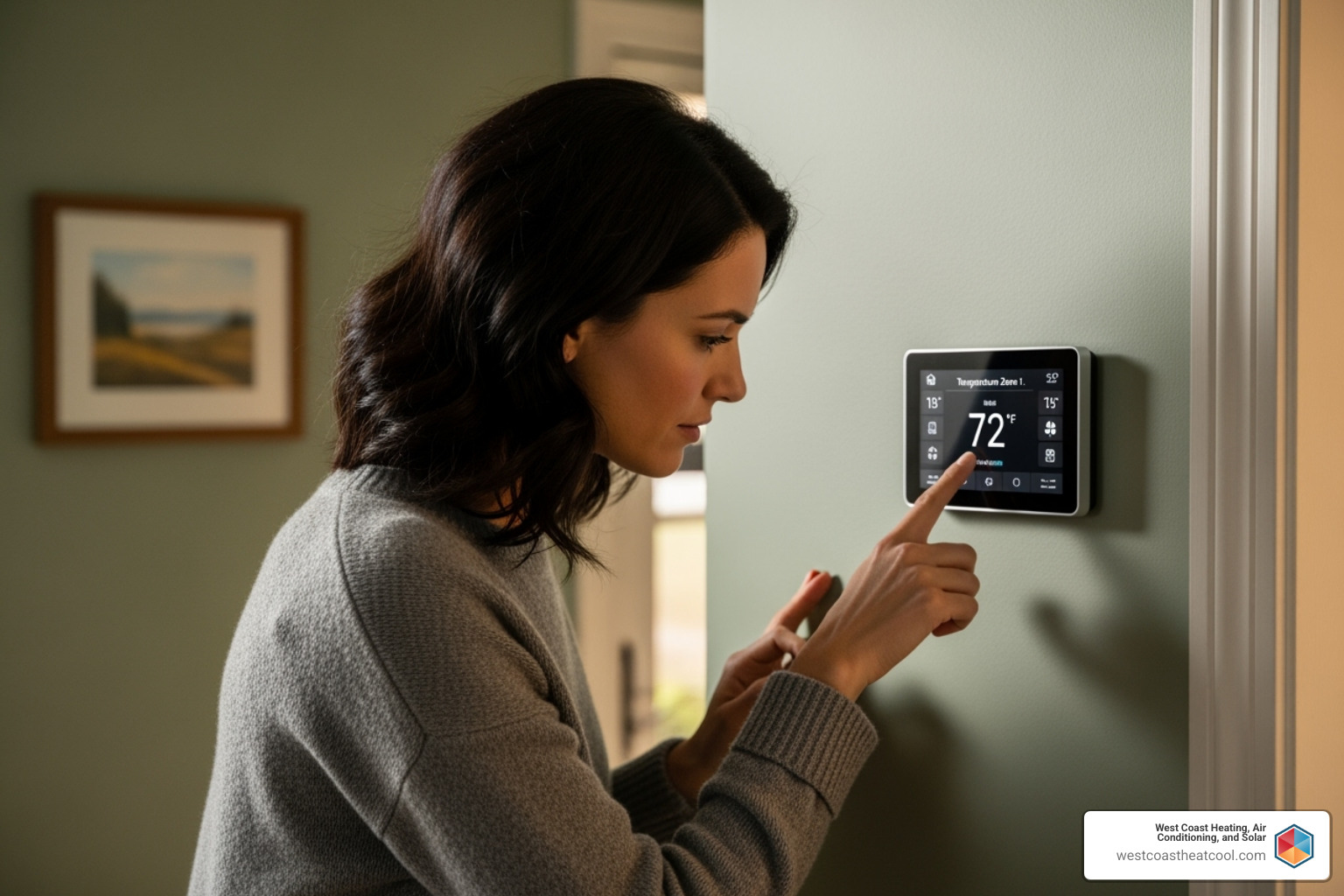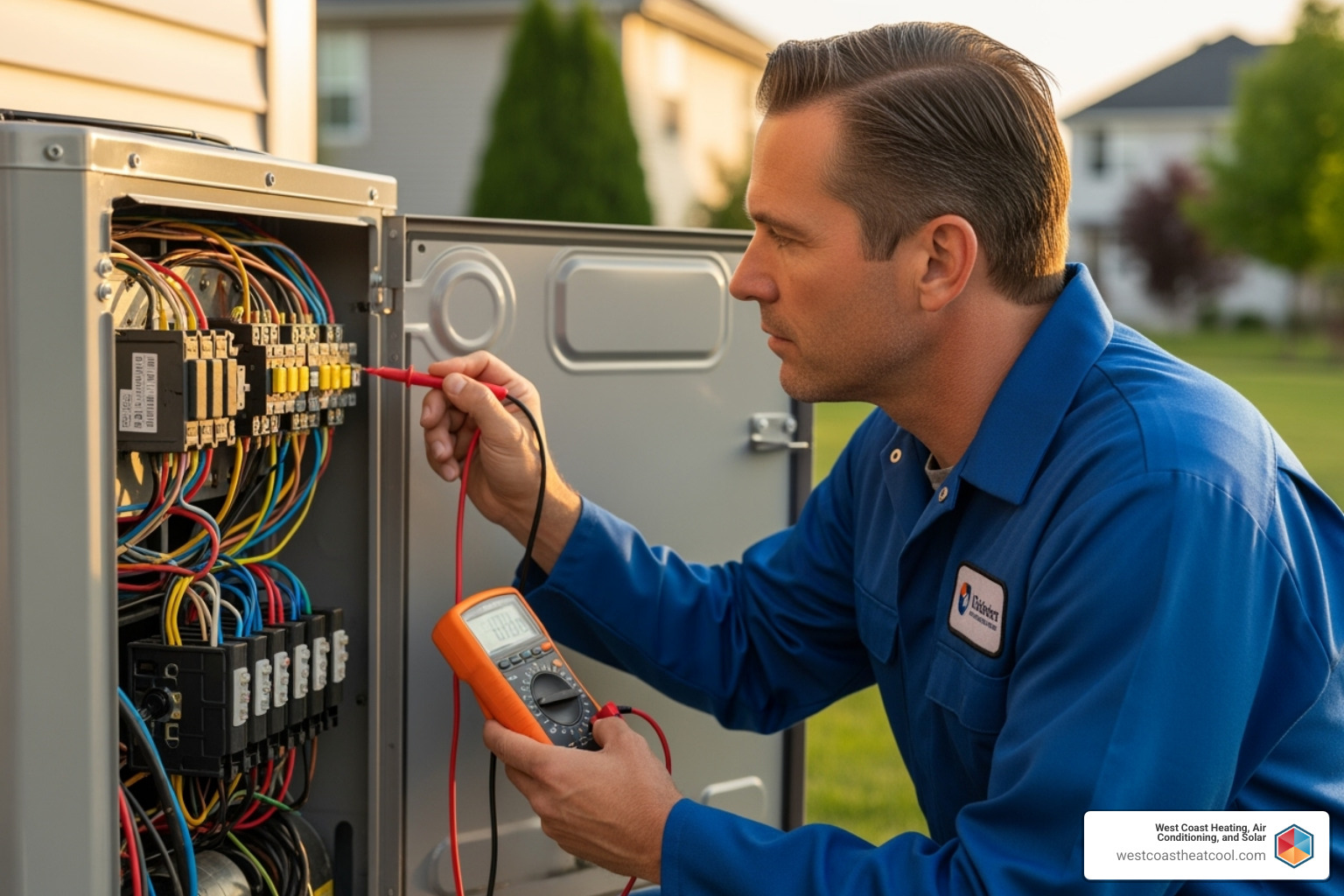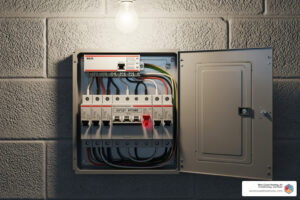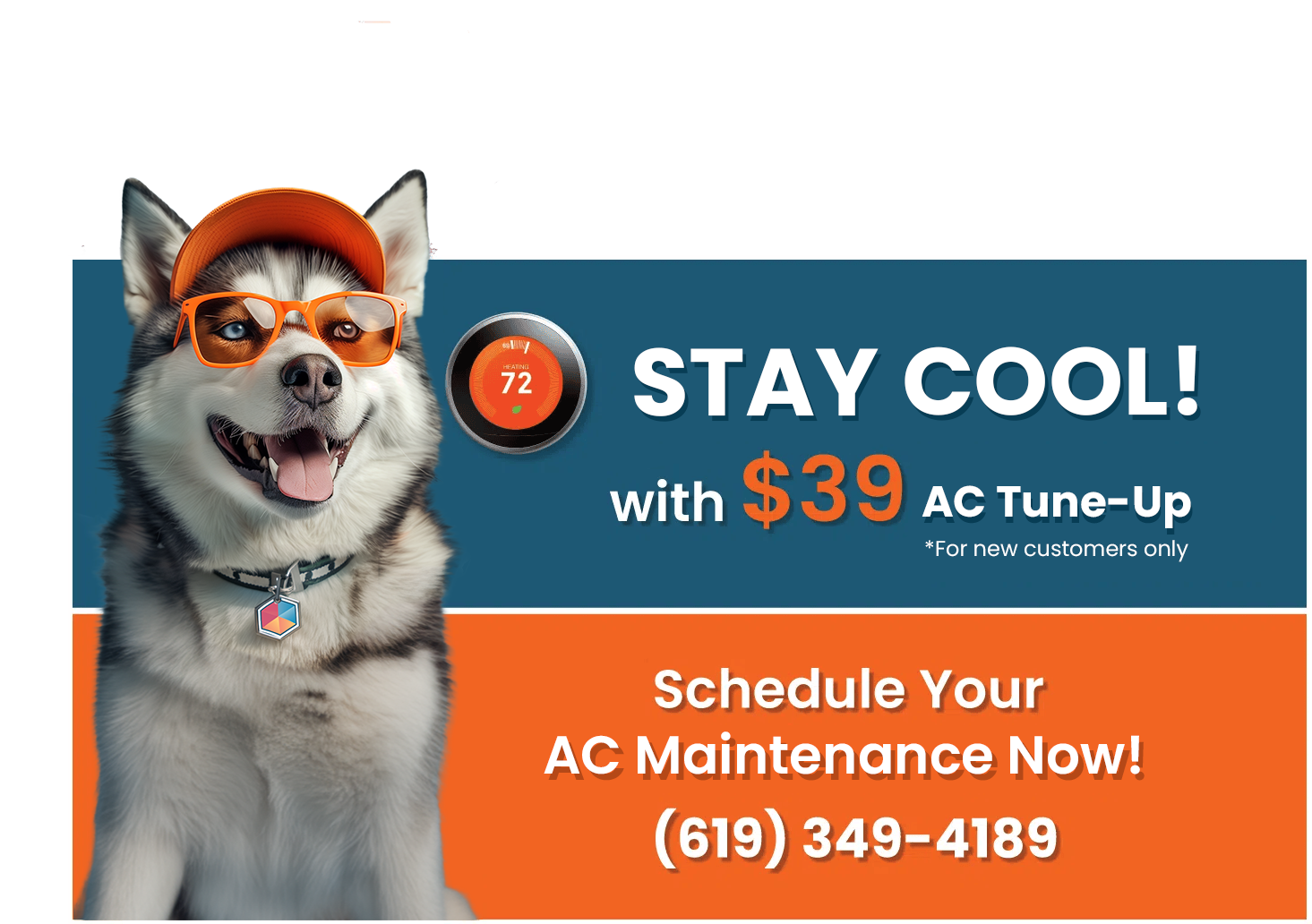What’s a Circuit Breaker and Why Does It Trip?
When your AC circuit breaker tripped, it means your electrical system’s safety device kicked in to protect your home. Here’s what you need to know right away:
Quick Actions When Your AC Trips the Breaker:
- Turn off your thermostat – This reduces strain on the system
- Reset the breaker once – Flip it fully OFF, then back ON
- Wait 30 minutes before turning your AC back on
- If it trips again immediately – DO NOT reset it again
- Call a professional – Repeated tripping signals a serious problem
A circuit breaker works like a safety guard for your home’s electrical system. It’s designed to automatically shut off power when it detects too much electrical current flowing through the wires. This prevents overheating, equipment damage, and most importantly – house fires.
Think of it this way: if electricity were water, your circuit breaker would be like a dam that closes when there’s too much flow. When your AC pulls more power than the circuit can safely handle, the breaker “trips” and cuts the electricity.
Two main reasons cause breakers to trip:
- Circuit overload – Your AC is drawing more electricity than the wires can handle
- Short circuit or ground fault – Electricity is taking a dangerous shortcut through damaged wires or components
The research shows that 99% of the time, there’s a real reason your breaker tripped. Simply resetting it without finding the cause can lead to equipment damage, fire hazards, or even dangerous electrical arcs.
Why Your AC Circuit Breaker Tripped: Common Culprits
Picture this: it’s blazing hot outside, you’re relying on your AC to keep you comfortable, and suddenly… silence. The cool air stops flowing. You trudge to your electrical panel and find the culprit – your AC circuit breaker tripped.
Don’t panic! This actually happens more often than you’d think. Your air conditioner is one of the most power-hungry appliances in your home, and when something goes wrong, it can demand more electricity than your circuit can safely handle.
Here’s the thing – when your AC circuit breaker tripped, it’s actually doing its job perfectly. It’s protecting your home from electrical overloads that could damage your equipment or even start a fire. Think of it as your electrical system’s bouncer, stepping in when things get too intense.
But why did it happen in the first place? Let’s walk through the most common reasons, from simple fixes you might handle yourself to serious problems that need professional attention.
Simple Maintenance Issues
Sometimes the reason your AC circuit breaker tripped isn’t dramatic at all – it’s just your system crying out for some basic TLC. These maintenance issues might seem minor, but they can force your AC to work overtime, drawing excessive power and triggering that breaker.
The biggest troublemaker? A dirty air filter. When your filter gets clogged with dust, pet hair, and debris, it’s like forcing your AC to breathe through a straw. Your blower motor has to work much harder to pull air through that blockage, consuming way more electricity than normal.
We see this all the time – homeowners forget to change their filters for months, then wonder why their system keeps tripping the breaker. The fix is simple: replace your filter every 1-3 months. Not only will this prevent breaker trips, but it’ll also help if your AC not cooling properly has been an issue.
Your outdoor unit can cause problems too when dirty condenser coils get covered in dirt, leaves, grass clippings, or other debris. These coils need to release heat from inside your home to the outside air. When they’re dirty, heat transfer becomes inefficient, forcing your compressor to run longer and work harder.
It’s like trying to cool down while wearing a heavy winter coat – your system just can’t get rid of heat effectively. This extra strain increases power consumption and can easily trip your breaker. Keep the area around your outdoor unit clean and clear, with at least two feet of space on all sides.
Serious AC Component Failures
When maintenance issues aren’t the culprit, you’re likely dealing with actual component failures inside your AC system. These problems are more serious and usually require professional diagnosis and repair.
Your compressor – the heart of your AC system – is often the troublemaker. This component uses a significant amount of electricity under normal conditions, but when it starts failing, things get complicated fast. A struggling compressor might experience hard starting, where it needs massive electrical surges just to get going. Each startup attempt can be enough to trip your breaker.
Even worse is a grounded compressor, where internal electrical windings break down and make contact with the compressor housing. This creates a direct short circuit that instantly trips the breaker and usually means you need a new compressor.
Fan motor problems can also trigger breaker trips. Whether it’s the outdoor condenser fan or indoor blower motor, a failing fan disrupts airflow over the coils. Without proper airflow, your entire system overheats, forcing the compressor to work harder and draw more power. If your AC fan isn’t working at all, that’s a clear sign you need professional help.
Don’t overlook the capacitor either. This small but crucial component provides the electrical “kick” your compressor and fan motors need to start up. When capacitors fail, motors can’t start properly and may draw excessive current while trying, which trips the breaker every time.
Finally, refrigerant leaks create an indirect path to breaker trips. When your system is low on refrigerant, it can’t cool efficiently, so it runs constantly trying to reach your thermostat setting. This extended runtime, combined with potential overheating, increases power consumption and can eventually trip the breaker.
Electrical System Problems
Sometimes your AC unit itself is perfectly fine, but your home’s electrical system has issues that cause the AC circuit breaker tripped situation. These electrical problems range from relatively minor to potentially dangerous.
A short circuit happens when electricity takes an unintended shortcut, usually because damaged wiring allows hot wires to touch neutral wires or other hot wires. This creates a massive, instantaneous surge of current that immediately trips the breaker. If your AC is making buzzing noise, it could signal this type of electrical problem.
Ground faults are similar but occur when hot wires contact grounded surfaces or ground wires. Like short circuits, they cause instant breaker trips and represent serious safety hazards that need immediate professional attention.
Loose wiring connections might seem less dramatic, but they’re surprisingly common. Over time, vibrations from your AC’s operation and normal expansion and contraction from temperature changes can loosen electrical connections. Loose connections create resistance, generate heat, and can cause erratic breaker tripping even when your AC isn’t actually overloaded.
Sometimes the problem is a faulty breaker itself. Circuit breakers do wear out over time, especially ones that have tripped repeatedly. A worn breaker might trip when it shouldn’t, or worse – fail to trip when it should, creating dangerous conditions.
Lastly, you might be dealing with an undersized circuit. If the electrical circuit dedicated to your AC wasn’t properly sized when installed, it simply can’t handle your unit’s normal power demands. This is a design problem that requires an electrician to install appropriately sized wiring and breakers for your specific AC unit.
Your Step-by-Step Guide Before Calling for Help
When your AC circuit breaker tripped, don’t panic! Yes, it’s frustrating when your cool air suddenly disappears on a hot day, but there are some simple troubleshooting steps you can take first. Think of this as your detective work before calling in the professionals.
Safety comes first, always. We can’t stress this enough – electrical components demand respect. If you smell burning, see scorch marks, or feel uncomfortable doing any of these steps, skip straight to calling a pro.
How to Safely Reset Your AC’s Circuit Breaker
Here’s the right way to reset your breaker – and trust us, there’s definitely a wrong way that can damage your equipment.
Start at your thermostat. Turn it completely off before you even think about touching that breaker. This prevents your AC from trying to start up the moment you restore power, which could cause another immediate trip.
Next, head to your electrical panel – that gray metal box that’s probably hiding in your garage, basement, or utility closet. Look for the breaker that’s out of place. It might be sitting halfway between “on” and “off,” or it could be fully flipped to “off.” Your AC breaker is usually labeled something like “AC,” “HVAC,” or “Air Conditioning.”
Here’s the important part: flip the breaker fully OFF first. Don’t just push it to “on” – you need to reset the internal mechanism by pushing it all the way off until you hear that satisfying click. Then flip it back to “on.”
Now comes the hardest part – waiting 30 minutes. We know it’s tempting to rush back and crank up the AC, but your system needs time to reset. The compressor especially needs to cool down and equalize pressure. Think of it like letting your car engine cool down after overheating.
After your patience pays off, go back to your thermostat and turn your AC back on. If it starts up and keeps running, you might have just solved a temporary overload issue. But if your AC won’t turn on or the breaker trips again, it’s time for the next steps.
What to Check if the AC Circuit Breaker Tripped Again
If that breaker tripped again, your AC is trying to tell you something. Before you call for backup, let’s do a little more detective work.
Check your air filter first. Pull it out and take a good look. If it looks like it’s been through a dust storm, that’s your problem right there. A clogged filter makes your blower motor work overtime, drawing extra power that can trip the breaker. Swap in a fresh filter and see if that solves it.
Take a walk outside to inspect your outdoor unit. You’re looking for anything that shouldn’t be there – leaves, grass clippings, that tennis ball your dog lost last month. Clear away any debris around the unit and make sure there’s plenty of breathing room. Overgrown bushes or plants crowding your condenser can cause the same overheating problems as a dirty filter.
Sometimes the issue isn’t just your AC – it’s electrical overload from other appliances. If someone’s running the vacuum while you’re blow-drying your hair and the microwave is reheating lunch, that’s a lot of electrical demand. Try unplugging non-essential items and see if your AC can start without tripping the breaker.
Now for the warning signs that mean “stop and call a professional immediately.” If you notice a burning smell around your AC or electrical panel, that’s a serious fire hazard. Buzzing or crackling sounds from the breaker panel are equally concerning. Scorch marks or blackened areas around breakers or outlets mean dangerous overheating has already occurred.
Don’t ignore these red flags. Your safety is worth more than trying to fix it yourself. When you see any of these warning signs, it’s time to call West Coast Heating, Air Conditioning, and Solar for professional help.
When to Call a Professional for Your Tripped Breaker
Look, we get it. Nobody wants to call for help when they think they can handle something themselves. But when your AC circuit breaker tripped and keeps doing it despite your best troubleshooting efforts, it’s time to wave the white flag and bring in the pros. Trust us on this one – what seems like a simple electrical hiccup can quickly turn into a dangerous and expensive nightmare if you ignore it.
The Dangers of Repeatedly Resetting the Breaker
Here’s the thing about circuit breakers – they’re not being dramatic when they trip. They’re actually your home’s unsung heroes, working overtime to keep you safe. When you keep flipping that breaker back on without fixing the real problem, you’re essentially telling your safety system to take a hike.
Fire hazard is the big scary one we have to talk about. When your AC circuit breaker tripped, it happened because too much electricity was flowing through wires that can’t handle it. That excess current creates heat – lots of it. Keep forcing electricity through an overloaded system, and those wires can get hot enough to melt their insulation and ignite nearby materials. House fires from electrical problems are no joke, and they often start this way.
Then there’s something called arc flash risk. This sounds like science fiction, but it’s very real and very dangerous. When you reset a breaker that’s dealing with a short circuit, you can create an explosive burst of heat and light. We’re talking about temperatures hotter than the surface of the sun for a split second. People have been seriously injured or killed by arc flashes, and it can happen faster than you can blink.
Your AC components are taking a beating too. That compressor we mentioned earlier? It’s expensive – really expensive. When it’s struggling and you keep forcing it to run by resetting the breaker, you’re accelerating its death. What might have been a simple repair could turn into needing a whole new compressor, or worse, finding your AC is too old and needs replacement entirely.
And let’s be honest about your wallet – an AC that’s constantly tripping breakers is guzzling electricity like a teenager goes through snacks. Your utility bills are probably climbing while your comfort is plummeting.
Who to Call: HVAC Pro or Electrician?
This is probably the most common question we hear after “Why did this happen to me?” The good news is, you don’t have to play electrical detective to figure it out.
Start with an HVAC technician – that’s us! About 90% of the time when your AC circuit breaker tripped, the problem lives inside your AC system, not in your home’s electrical panel. We’re trained to spot the troublemakers: that failing compressor that’s trying to start but can’t quite get there, the worn fan motor that’s working three times harder than it should, or the faulty capacitor that’s supposed to give your system the electrical boost it needs but is falling down on the job.
We also know how to handle refrigerant problems. Low refrigerant doesn’t just mean poor cooling – it forces your entire system to work overtime, drawing more power and eventually tripping that breaker. Plus, we can tackle all those maintenance issues that might be the real culprits, like cleaning those dirty condenser coils or checking that your outdoor unit isn’t being strangled by overgrown bushes.
Here’s something many homeowners don’t realize – we can also handle a lot of electrical work within your AC system itself. We can tighten loose connections, replace worn wiring inside the unit, and even install “hard start” kits that help aging compressors get going without that massive power surge.
Now, if we come out and find that your AC is running perfectly but the breaker keeps tripping anyway, that’s when we’ll recommend calling an electrician. They’re the experts when the problem is with your home’s electrical panel, breaker replacement, or if you need a dedicated circuit with heavier wiring to handle your AC’s power needs. Sometimes older homes just weren’t wired for today’s high-efficiency AC systems.
The bottom line? Don’t stress about making the wrong choice. Our home AC repair services team can quickly determine whether the problem is with your AC or your electrical system, and we’ll point you in the right direction if you need an electrician instead. We’re here to solve your problem, not just sell you something.
Frequently Asked Questions about Tripped AC Breakers
We get calls every day from homeowners dealing with their AC circuit breaker tripped, and honestly, the same questions come up again and again. You’re not alone in this frustration! Let’s tackle the most common concerns we hear.
How can I prevent my AC breaker from tripping in the future?
Nobody wants to deal with a tripped breaker on the hottest day of the year. The good news? Most breaker trips are totally preventable with some simple habits.
Regular maintenance is your best friend here. Think of it like getting your car serviced – a little attention now saves you from big headaches later. When our technicians come out for annual tune-ups, we catch the small problems before they turn into AC circuit breaker tripped emergencies.
Clean filters are absolutely crucial. We can’t tell you how many service calls we could prevent if homeowners just changed their filters every 1-3 months! A dirty filter makes your blower motor work like it’s running a marathon while breathing through a straw. That extra strain is often what tips your system over the edge.
Your outdoor unit needs some love too. Clean coils and proper airflow make all the difference. Those condenser coils outside work hard to dump heat from your home, and when they’re clogged with dirt and debris, your whole system struggles. A gentle rinse with your garden hose (power off first!) can work wonders, though we recommend professional cleaning for the deep stuff.
Here’s something many folks don’t think about: don’t overload your circuits with other appliances. Running your vacuum, microwave, and hair dryer all at once while your AC is cranking can push things over the limit. Spread out those high-power activities, and your electrical system will thank you.
What does a buzzing or humming sound from the circuit breaker mean?
This question always makes us sit up straight because a buzzing circuit breaker is serious business. We’re not talking about the gentle hum you might hear from a busy electrical panel – we mean that distinct, concerning buzz that makes you stop and listen.
That buzzing usually means you’ve got a loose connection somewhere in your panel. Over time, wires can work themselves loose from vibration and temperature changes. When electricity has to jump across those loose spots, it creates heat and that telltale buzzing sound.
Sometimes the breaker itself is failing. Like any mechanical device, breakers wear out over time, especially if they’ve been tripping frequently. A dying breaker might buzz as its internal components struggle to do their job.
Whatever’s causing it, a buzzing breaker is a serious fire hazard. We’ve seen what happens when these situations go unaddressed, and it’s not pretty. Turn off your AC immediately at the thermostat, don’t touch that breaker, and call a professional right away.
If your AC is making grinding sounds, that’s a different problem entirely, but both deserve immediate attention.
Why does my AC breaker trip instantly after being reset?
When your AC circuit breaker tripped and then trips again the second you reset it, that’s your electrical system screaming “STOP!” There’s no delay, no chance for the AC to even try to start – just an immediate trip.
This instant tripping almost always means you’ve got a dead short somewhere in the system. Picture electricity taking a dangerous shortcut where it shouldn’t go – maybe through damaged wires or a failed component. The massive surge of current that results is exactly what breakers are designed to stop.
A severe ground fault can cause the same instant trip. This happens when a hot wire finds its way to a grounded surface, creating an immediate and dangerous path for electricity.
Here’s the most important thing we can tell you: DO NOT reset that breaker again. We know it’s tempting, especially when you’re sweltering, but repeatedly forcing power into a circuit with a dead short is incredibly dangerous. You’re risking arc flashes, fire, and serious damage to your home’s electrical system.
This is definitely not a DIY situation. If your AC keeps shutting off instantly after each reset attempt, you need professional help immediately. We have the specialized equipment to safely track down exactly where that short is hiding and fix it properly.
The bottom line? Your breaker is doing its job by protecting you. Let the professionals figure out why it’s working so hard.
Stay Cool and Safe with Professional AC Service
When your AC circuit breaker tripped, it’s telling you a story – and it’s not just about inconvenience on a hot day. Your electrical system is actually doing its job, protecting your home from potential damage or fire. Think of it as your house’s way of raising its hand and saying, “Hey, we need some help over here!”
A single trip might just be a minor hiccup – maybe a temporary power surge or a brief overload. But when that breaker keeps tripping? That’s your cue to take it seriously. Safety first is more than just a saying when it comes to electrical issues. Ignoring repeated trips can turn a manageable repair into a dangerous situation or an expensive system replacement.
Professional diagnosis is key because electrical problems can be tricky. What looks like a simple AC issue might actually be hiding a more complex electrical fault. Or what seems like a major electrical problem could just be a dirty air filter causing your system to work overtime. Without the right tools and expertise, it’s nearly impossible to know for sure.
We get it – dealing with AC problems during those warm San Diego days can be incredibly frustrating. Nobody wants to sweat it out while trying to figure out what’s wrong. That’s exactly why we’ve been helping families across San Diego County stay comfortable since 1996.
At West Coast Heating, Air Conditioning, and Solar, we’ve seen just about every reason an AC circuit breaker tripped – from the simple fixes to the complex electrical mysteries. Our experienced technicians come equipped with the diagnostic tools and know-how to get to the root of the problem quickly and safely. Whether it’s routine maintenance that’s been put off too long, a failing component that needs replacement, or an electrical issue that requires coordination with other professionals, we’ve got you covered.
We serve communities throughout the region, bringing our customer-focused approach right to your doorstep. From Chula Vista to Encinitas, Escondido to Carlsbad, and everywhere in between, we’re committed to keeping your home comfortable year-round. Our comprehensive solutions include financing options and club memberships designed to make maintaining your HVAC system both affordable and convenient.
Don’t let a tripping breaker leave you in the heat. When you need reliable AC repair services in El Cajon, CA or anywhere else in San Diego County, we’re ready to help. Your comfort and safety are our top priorities – let’s get your AC running smoothly again!


